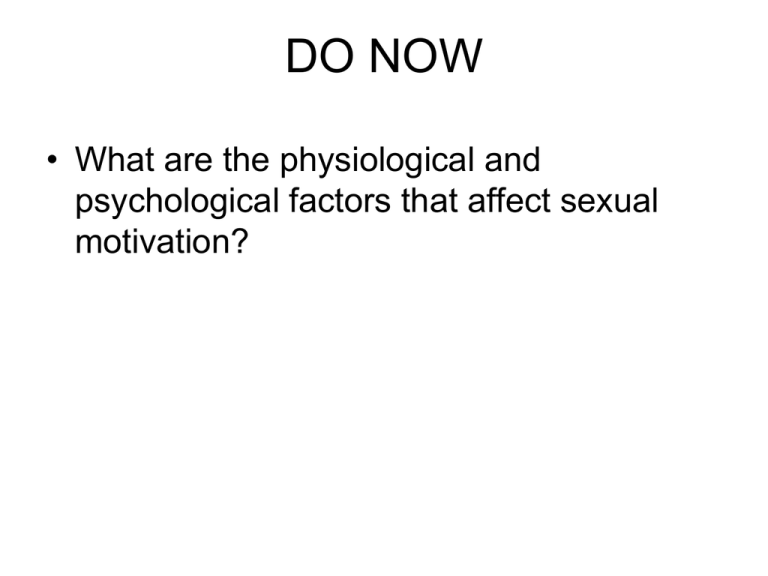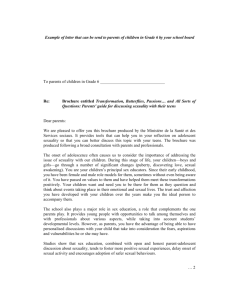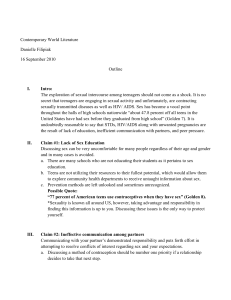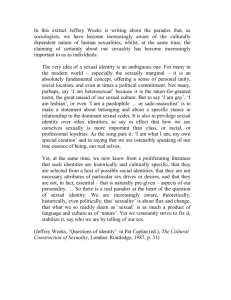
DO NOW
• What are the physiological and
psychological factors that affect sexual
motivation?
Kinsey (2004)
• https://www.youtube.com/watch?v=ppZwS
ABxeYE
Kinsey’s Studies
• Confidential interviews
with 18,000 people (in
early 1950’s).
• Sexual Behavior in
the Human Male and
Sexual Behavior in
the Human Female
• Scale of sexuality….0
to 6 where 0 is
exclusively
heterosexual and 6
homosexual and 7 is
asexual.
Click on Kinsey to see the movie
trailer.
We have discussed the energizing of sexual
motivation but have yet to discuss its direction:
Sexual Orientation
An enduring sexual attraction toward members of
either one's own gender or the other gender.
Percentage, brothers and cities
How is Sexual Orientation
Determined
• NO evidence that sexuality
is socially determined
• Kids raised by gay parents
no more likely to be gay
than if raised by hetero
parents.
• Thus, it is likely biologically
determined.
The Brain
• Simon LeVay
• Discovered cluster of
cells in hypothalamus
that is larger in hetero
men than in hetero
women or homosexual
men
Prenatal Environment
• Current research
seems to point to the
hormonal levels in the
prenatal environment.
• We have created
homosexual male fruit
flies and lesbian sheep!!!
What is the trend for attitudes toward
homosexual relationships?
How do different countries view having
children before marriage?
We can have same drives, but different attitudes
Births to Unwed Parents
How does
Britain
compare to
Japan?
Facts about Adolescent Sexuality
• 1900: 3% had sex by age 18
• 2007: 50% have sex by age 18
• 47% of high school seniors
have had sex
• 72% of teenage girls regretted
having sex the first time
• Teens get most sex
information from peers and
media rather than parents
• Correlation between sexually
active teens and alcohol using
teens
• Average hour-long TV show
has 15 sexual acts, words, and
innuendos
• Higher intelligence
correlated with delaying
sex
• Actively religious teens
more often reserve sex for
marital commitment
• Father’s absence linked to
sexual activity before age
16
• Teen volunteers have
lower pregnancy rates
• Only 1/3 of sexually active
male teens use condoms
regularly
Fun Quote of the Day: “Condoms should be used on every conceivable
occasion.”
STDs/STIs
• Condoms offer no
protection against
certain skin-to-skin
STIs (most genital
cancers)
Herpes
• If Pat has sex with 9 people, each of whom
over the same period has sex with 9 people,
who in turn have sex with 9 others, how
many “phantom” sex partners (past partners
of partners) will Pat have?
• (511)
Media Influence?
• Does “sex” in the media make teens
more sexually active?
• If so, how?
• Is there a difference in the way they
affect male vs female teens?
Sex Sells?
•“Sex Sells”
•by Lisa Wade, Mar 2, 2009, at 02:24 am
That’s the refrain anyway. But whose sex is sold? And to who? If it
was simply that sex sold, we’d see men and women equally sexually
objectified in popular culture. Instead, we see, primarily, women sold to
(presumably heterosexual) men. So what are we selling, exactly, if not
“sex” We’re selling men’s sexual subjectivity and women as a sex
object. That is, the idea that men’s desires are centrally important and
meaningful, and women’s are not (because women are the object to
men’s subjectivity).
That women’s object status and men’s subjectivity is sold to women in
women’s magazines (for example, Cosmo and Glamour always feature
scantily clad women on the cover) in no way undermines the idea that
men’s sexual subjectivity is being sold. It’s just that it’s being sold to all
of us.
What must one do to Minnie to make her an acceptable
fashion icon? Starve her down to a stick figure, apparently.
Contrast Effect
• In one study, partners viewed pictures of
idealized individuals (genetically rare,
plastic surgery enhanced, photoshopped
images), then rated their own partners less
positively.
• In even more disturbing study, men
reported lower levels of LOVE and
COMMITMENT to their current partners
after viewing Playboy centerfolds
Fashion Industry
Modeling Industry
Diet Industry
• $60 Billion dollar
industry (including
diet books, diet drugs
and weight-loss
surgeries.)
• 85% of customers are
females
• It has a failure rate in
the 90s.
Set-Point Theory
• According to the set-point theory, there
is a control system built into every
person dictating how much fat he or
she should carry – a kind of thermostat
for body fat.
• Some individuals have a high setting,
others have a low one.
• According to this theory, body fat
percentage and bodyweight are
matters of internal controls that are set
differently in different people.
Can dieting change the set point?
• Dieting does nothing
• Dieting research demonstrates that body has more than
one way to defend its fat storage
• Long-term caloric deprivation (starving) can signal the
body to slow down its metabolism.
• Body reacts as though famine has set in.
• Within a day or two after semi-starvation begins,
metabolic machinery shifts to more cautious state to
conserve calories it already has.
• Dieting becomes progressively less effective
• Plateau is reached at which further
weight loss seems impossible.
How to change the set point
• The ideal approach to weight
control would be a safe method
that lowers or raises the set
point rather than simply
resisting it.
• No one knows for sure how to
change the set point, but some
theories exist.
– regular exercise is the most
promising as a sustained
increase in physical activity
seems to lower the setting
Messing with Set-Point
• Studies show that a person’s
weight at the set point is
optimal for efficient activity and
a stable, optimistic mood.
• When the set point is driven
too low, depression and
lethargy may set in as a way
of slowing the person down
and reducing the number of
calories expended.
Both Anorexia Nervosa and
Bulimia Nervosa are more
commonly seen in females with
estimates of male-to-female ratio
ranging from 1:6 to 1:10
Eating Disorders
What causes eating disorders?
– Genetics may influence susceptibility
– Those with greatest body dissatisfaction
– Western cultures idolize thin women
» Cultural pressure transmitted by the
“thin-ideal” exemplified in
advertisements
Women’s Body Images
Key Point #1:
Media portrayals of
men and women are
radically different.
Key Point #2
• The people you see are fake.
They are genetically rare,
plastic surgery enhanced and
extensively photoshopped.
• Average model is size 0 or 00 she is 5’10’’
110 lbs.
• Average American woman is size 12 to 14
and is 5’4’’ 140 lbs.
Key Point #3
• We mindlessly marinate in this Toxic
Media environment.
• Cultivation Theory- the longer you spend
staring at the simulacra the more you just
assume it is reality’s default setting.
• Wake up.





